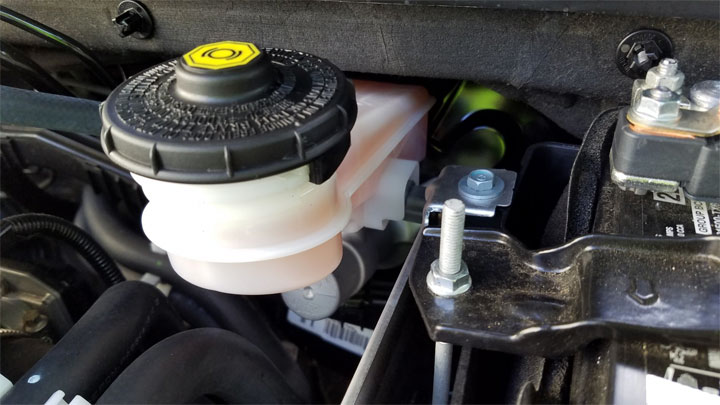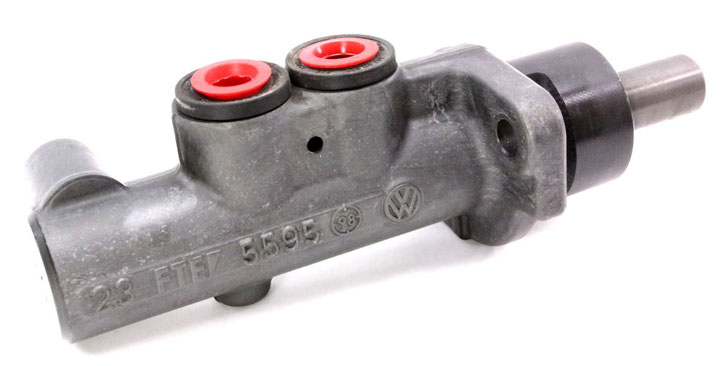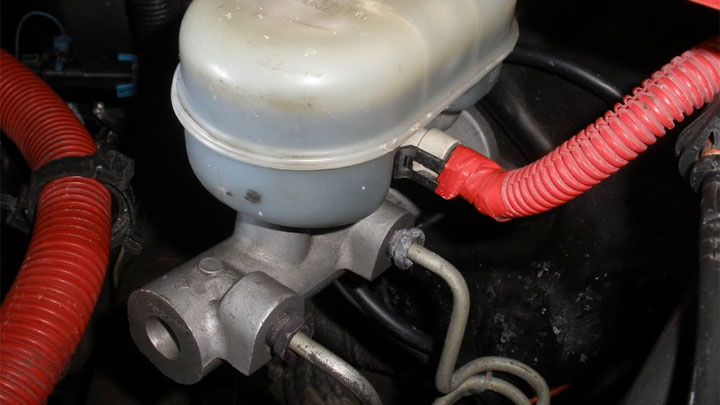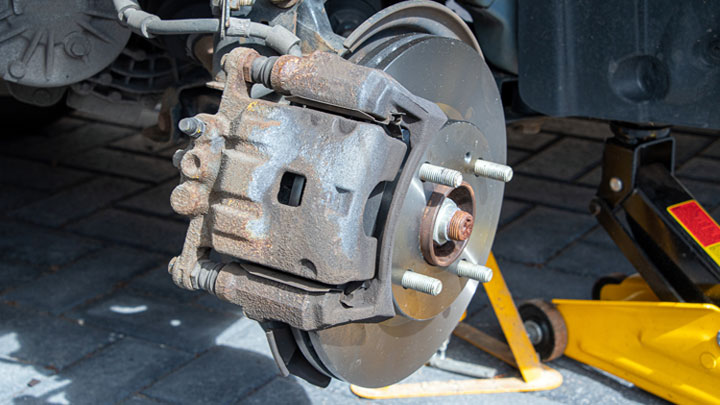Last Updated on June 13, 2022
The brake master cylinder is a critical component of any vehicle’s braking system. Here you are going to learn about the function of this component as well as the symptoms that you can expect when it fails.
For those who find themselves with a faulty brake master cylinder, we will touch upon the average cost to replace it. If you don’t replace it, then the safety of those in the vehicle will be in jeopardy.
How a Brake Master Cylinder Works
The function of the brake master cylinder is to turn brake pedal pressure into hydraulic pressure. The master cylinder accomplishes this by providing the brake circuit with brake fluid.
It also manages the amount of brake fluid that gets transferred, according to the pressure placed on the brake pedal. Whether you have drum brakes or disc brakes in your vehicle, it has a brake master cylinder in it.
The law requires that vehicles have two different braking circuits in them. The hydraulic pressure generated for them comes from tandem master cylinders. That way, if one braking circuit stops working, the other circuit will already have all the brake pressure to remain functional.
Whenever your foot pushes down on the brake pedal, the pressure piston receives the power pressure of your foot. This pushes the piston further near the brake line.
In older cars, the force of the brake is generated after the pressure chamber closes from the piston collar going on top of the bore. Modern cars have a spring supporting the pressure piston. As a result, when you take your foot off the brake pedal, it goes back to its starting position.
Once this happens, the brake fluid goes back into the master cylinder. That way, the next time you press the brake pedal, it will increase the brake pressure again.
See Also: Symptoms of a Bad Clutch Master Cylinder
Top 4 Bad Brake Master Cylinder Symptoms
#1 – Brake Fluid is Contaminated

There are rubber seals on brake master cylinders that get worn out after a while. If the rubber seals get in too bad of shape, the brake fluid will become contaminated and turn a darker color.
Another effect of worn rubber seals is the inability for the master cylinder to sustain the amount of brake pressure placed on it. As a result, the brake pedal will feel mushy and start falling to the floor slowly.
#2 – Brake Pedal Abnormalities

When a brake master cylinder goes bad, one of the first things you’ll notice is the brake pedal acting strangely. After all, the brake pressure of the braking system comes from the brake master cylinder. If it can’t process or seal this pressure like it normally does, then you’ll feel abnormalities with the brake pedal.
Getting back to the rubber seals of the master cylinder, if they are worn then it will cause brake fluid to leak internally. Once this happens, the pedal will feel mushy and it will gradually fall to the floor after you take your foot off it.
#3 – Low Levels of Brake Fluid

If the brake master cylinder has a low level of brake fluid, you will likely have some braking issues. The first thing you’ll notice is the brake pedal feeling soft as you lift your foot up on it.
If there are no fluid leaks and the brake fluid level look normal, then your master cylinder is probably the culprit. The brake fluid in the reservoir needs to be sealed up in there and any hose connection needs to be tight and secure.
If you find that there’s a leak from the brake master cylinder and are sure it’s not a loose hose, cracked reservoir, or leaking lid, get the brake cylinder replaced asap.
#4 – Check Engine Light Illuminates

Many newer cars have master cylinders with pressure sensors and brake fluid sensors built into them. These sensors will detect if there is something wrong with the brake fluid pressure of the vehicle.
If it finds the pressure dropping, for example, then the master cylinder is likely the cause and a diagnostic trouble code will be recorded by the car’s ECU and this will set off the “Check Engine” warning light on the dashboard.
If this light were to illuminate then it could possibly be because of the master cylinder. Of course, you won’t know the exact cause of the check engine light until you get your car scanned.
But if the light appears alongside any other symptom here, there’s a chance it’s your master cylinder. Using an OBD2 scanner is the only way to confirm what error code is stored.
Please Note: If you examine each exterior component and don’t see any signs of problems with them, then your brake master cylinder is definitely going bad. It may even have failed already. If you test your braking system and look for the symptoms listed above, you will be able to tell if your brake master cylinder is truly to blame or if there is some other component to blame.
Brake Master Cylinder Replacement Cost
Best places to order parts? See: 19 Best Online Auto Parts Stores

The total cost to replace a brake master cylinder will usually be somewhere in the range of $250 to $550 if you have a professional mechanic do the job.
A new brake master cylinder and any related parts (including new brake fluid) will cost anywhere from $100 to $300. Labor will run about $150 to $250. There will also be extra fees and tax charges on top of this.
Brake hoses and pipes are what connect the brakes to the brake master cylinder, which has brake fluid in it. Every time you put your foot on the brake pedal, there is a flow of brake fluid that comes out of the master cylinder and goes into each wheel’s braking unit.
This is how the friction gets created that slows the vehicle down. There are seals on the inside and outside of the brake master cylinder that can get worn after a while. Since the brake fluid is often contaminated, a brake fluid flush, change, and bleed also needs to be done.





Thank you for above but my problem is not mentioned. I have had all the brake parts either replaced or serviced bar the Master Cylinder on my car. The car runs freely until it gets warm and then the brakes seize solid. Even 4 bulky men and me in 1st gear would not budge her today. I have Mark 2 Ford Escort running gear on a 55 Ford prefect body. All 4 wheels were locked-both drum and disc brakes. When the system cools down all becomes free again. I have been told that there is a flow valve inside the Master Cylinder and that it can rust especially on a car that has been in store for over 4 years (as mine was). The occurrence time has become less. It now takes around a mile before she locks solid. Grateful for your thoughts please.
I had a 89 Ford Taurus, that did the same thing, whilst I was driving on the highway!! Got rid of it.
Its your proportionary valve….replace it
Where is the proportionary valve ??
I had the same problem and when my car was cooled down the breaking system worked fine. I replaced the brake fluid rubber hoses at the front because they were old and soft. Hoses were collapsing on the inside liner when hot preventing fluid to run through them and locking the braking system. No other parts had to be changed and the problem was fixed.